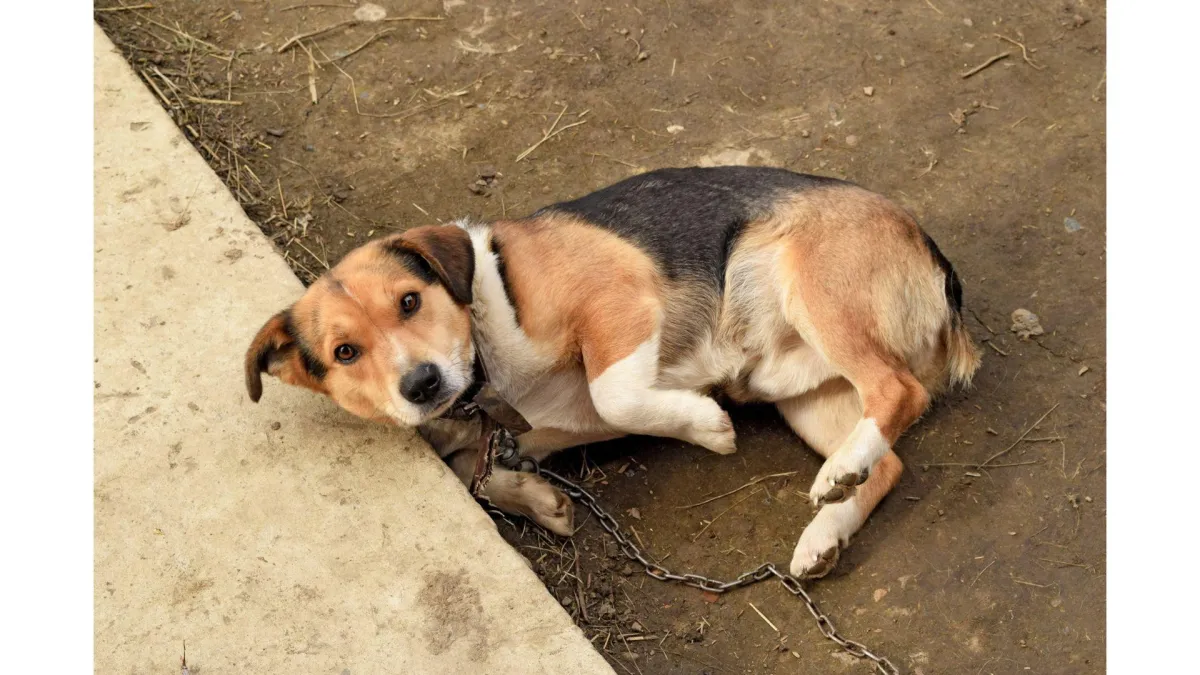
Winter cold and rain cause animal stress
As temperatures drop, it's natural for pet owners to turn up the heater and settle indoors. But while we stay warm, it's easy to forget that animals left outside in winter can suffer, particularly those that are tethered or confined to runs, kennels or cages.
Whether you're caring for a goat on a tether, a dog in a kennel, or a rabbit in a hutch, winter calls for extra vigilance. Cold, wet conditions can quickly compromise animal welfare, and what may seem like a small oversight can have serious consequences.
Tethered Animals Need Constant Monitoring
Tethered animals are especially vulnerable in winter. They are unable to seek out shelter or fresh bedding and are completely reliant on the person responsible for their care.
Goats are a common concern. Despite their reputation for hardiness, goats are poorly insulated against cold and wet weather. Unlike sheep, their coats are not waterproof and they lack subcutaneous fat.
Horses on tethers are also at risk. Without shelter, a horse left in wind and rain can quickly lose condition. Wet skin reduces insulation and increases the risk of hypothermia and rain scald.
If you must tether an animal, provide:
Constant access to dry, windproof shelter
Plenty of high-quality feed and water
A site that is well-drained and free from mud
Twice-daily checks, including immediately after heavy rain or frost
Goats, in particular, must have access to shelter at all times. Tethering without adequate shelter and regular checks is not only unkind, it is illegal under New Zealand’s animal welfare regulations. You can find more detail in our article on tethering goats.
The same applies to horses, which have additional legal requirements around exercise and supervision. If you are tethering any animal, you must meet strict standards for their care, or risk prosecution. You can find out more in our article on tethering horses.
Dogs in Kennels Need More Than a Roof
Winter conditions put extra stress on dogs that live outside, especially puppies or older animals.
Kennels should be raised off the ground, with solid flooring and a roof that doesn’t leak
Use plenty of dry straw, hay or pet bedding to insulate against the cold
Ensure the kennel is placed in a sheltered position, away from wind and rain
The dog must be able to stand, lie down and turn around comfortably
Dogs need more food in winter to maintain body heat. Check their water bowls often, especially on frosty mornings, and ensure they are not frozen over.
Puppies should not be kept outside overnight during winter. They lack the body mass and coat condition to cope with cold weather and are more likely to become sick or stressed.
Rabbits and Guinea Pigs Suffer in Mud
Small pets like guinea pigs and rabbits are often kept in outdoor hutches or pens. In winter, these can quickly become soggy, muddy and cold, especially when placed on lawns that stay wet for days.
Move hutches onto dry ground regularly
Make sure there is a fully enclosed section that is windproof and waterproof
Add plenty of dry bedding such as hay or wood shavings
Feed and water must be inside the dry area, not in the exposed run
It’s easy to assume these animals are coping, but many suffer in silence. Encourage children to check and clean their pets' housing before and after school, even when it's cold or wet.
Cats Also Need a Dry Place to Sleep
If you routinely put the cat out at night, make sure it has access to a warm, dry and sheltered spot. A box on the porch is not enough in a heavy downpour or a frosty night. Consider providing access to a shed, laundry or covered shelter.
Cats left without shelter in winter may seek warmth under cars, which puts them at risk of injury.
After Heavy Rain, Check First Thing
Winter brings long nights and early darkness, so by the time you're having your first coffee, some animals have already endured a cold, wet night. Check all animals first thing in the morning, especially after heavy rain, hail or high winds.
Early intervention can prevent health issues and ensure animals stay warm, dry and well-fed through the coldest months.
Want to make sure your animal care is up to standard?
Our What You Need to Know Before You Keep Livestock courses includes practical care tips for livestock.

